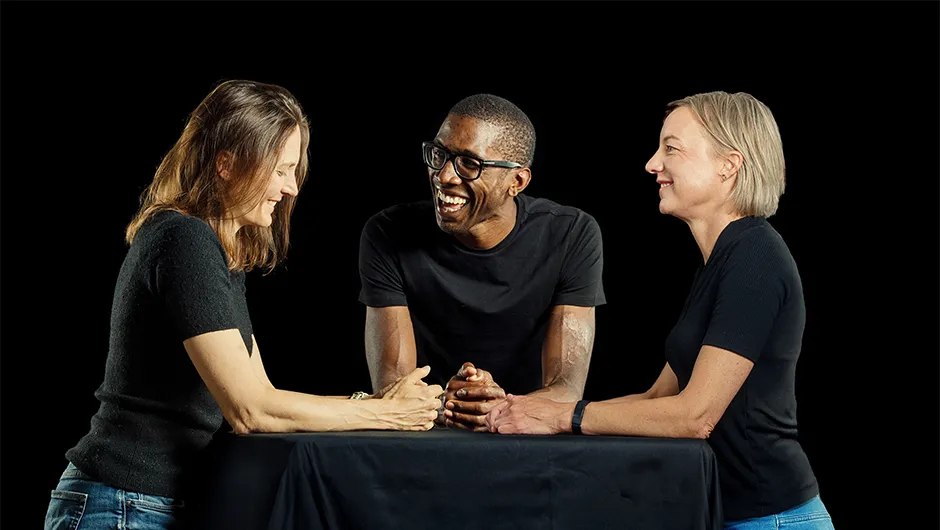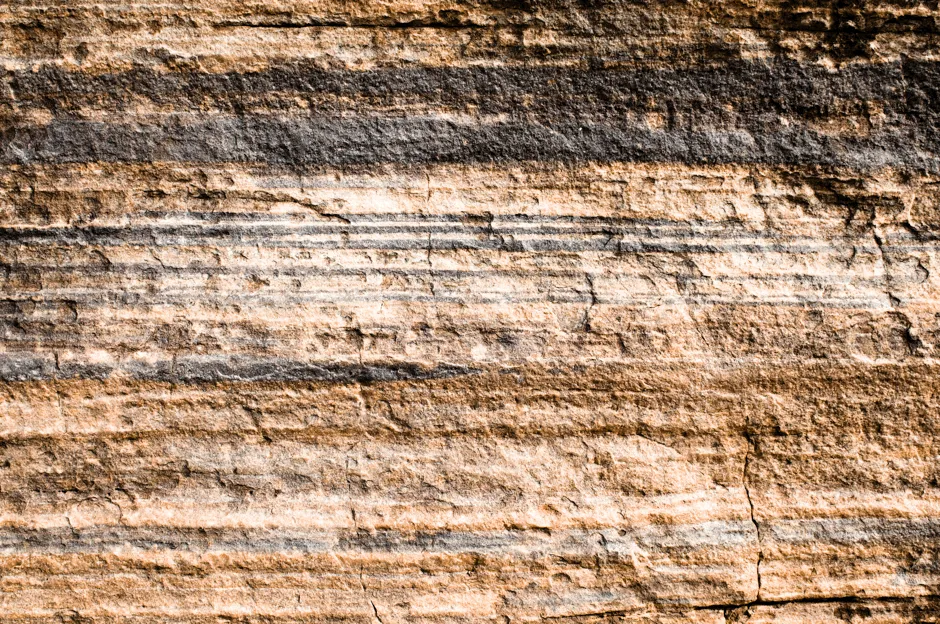The Royal Institution Christmas Lectures were started by Michael Faraday in 1825. They are now broadcast on national television every year, bringing scientists to our screens over three nights of the festive season.
The series of lectures has always been held in London, but this year, of course, is going to be slightly different.
The 2020 Christmas Lectures, titled Planet Earth: A User's Guide, are hosted by Professor Chris Jackson, Dr Helen Czerski and Dr Tara Shine.
- Lecture one airs tonight, 28 December, at 8pm on BBC Four.
In lecture one, geologist Chris Jackson will reveal our Earth's climate story through the rocks and the fossil record. We spoke to Chris for an episode of the Science Focus Podcast, which you can listen to in full at the bottom of this page. Here's what Chris told us about being a 2020 Christmas Lecturer.

It might seem like volcanoes would contribute to global warming. But it's not quite as simple as that, is it?
No. The main role that volcanoes play is by bringing carbon from deep within the Earth, and it's the carbon that that those volcanoes bring into the atmosphere that then creates carbon dioxide.
So, it sounds logical that volcanoes are hot and that the stuff that comes out of them is hot. But it's not the heat, it's the carbon that then charges the atmosphere with carbon dioxide, enhancing the greenhouse effect and causing global warming.
There's also an associated effect – a short term cooling after some major volcanic eruptions. So, when you have a major volcanic eruption, one thing that comes out of a volcano in addition to lava is ash. That's just fragmented rock particles.
Read more about volcanoes:
- 5 interesting facts about volcanoes to shake up what you know about them
- Computer model may help to more accurately predict volcano eruptions
What these rock particles do is form a blanket, which can be very rapidly and efficiently mixed in the atmosphere around the whole planet, such that there's less heat coming onto the Earth. So, it actually cools in the short-term, as there is less radiative energy coming from the Sun into the Earth.
These are the two effects of large volcanic eruptions. A short-term cooling, but then a long-term warming.
We can see, through the fossil records, the impact of humans, but also the changing climate that the Earth has had over its entire history. How can you use this information to understand what steps we need to take in the future against climate change?
For me, the exciting thing is a lot of the discussion around climate change is rightly in the here and now.But the geological record actually has allowed us to establish a baseline. It allows us to see how carbon dioxide levels and the Earth's temperature have changed over tens to hundreds to even billions of years.
So, we can get that baseline and then that allows us to put into context what is happening now and what may happen in the future.
Even more importantly than that, what we can also look at is the biodiversity through time. That is how life on planet Earth has changed in response to those changing temperatures, because that's ultimately what we, as selfish humans, are all about.

If you go and have a look at the rock record, that allows you to see how the total biodiversity was impacted by times on Earth, which were very, very hot. That gives us a sense as to the pace of change of the climate and temperature in particular, but also the response of life on Earth to those changes.
How far away are we from the baseline?
There have been times in the past where the carbon dioxide levels have been higher and there have been times in the past where the global average temperature has been higher [than it is currently].
What is unprecedented is the rate of CO2 rise and the rate of temperature rise as a function of human activity. So that's the that's the really important bit of this, and that's why going back into geological record and looking at the rates of change in the past – when you start to see what's happening now – that makes it, in my mind, the kind of the hugely concerning thing that it is. It's because it is without parallel in the rock record.
We're leaving behind our own rock record right now. What do you think our actions today are going to be revealing to people in 50, 100, or more, years time?
A lot of our activities on Earth are going to be recorded. The same way we can look at a core from 100 million years ago taken from beneath the seabed, and see the layers of rock – we're going to see layers of sediment which recorded our time on Earth.
One layer that we might see in there is a layer of plastic, for example, in the deep sea. Some of the plastic on land may not be preserved, but some of the things which are carried by winds and by currents into the deep sea may be recorded as a discrete or several discrete layers in the rock record. Radionuclides as well, from nuclear weapons testing.
Read more about plastic pollution:
- Sea spreads plastic waste thousands of kilometres from source in just months
- Annual plastic water pollution could reach 53 million tonnes by 2030
- Microplastics: Laundry filters 'dramatically' reduce fibres
There is going to be certain layers that are enriched in that material, which are going to be not seen in the older rock record. We will have an indelible fingerprint in there.
You never know, if we think that there may be another extinction driven as the function of the recent warming of the planet, maybe there's going to be a layer in the rock in which there is clearly a contraction of the biodiversity on Earth.
Hopefully, future geologists will see also the point at which we started to improve, change things and make a difference.
Yeah, you would like to think. I mean, we don't want to make it about achievements, "we were great and we turned this thing around" but, you'd like to think there is enough invention and innovation in humankind that we could take this challenge on.
I mean, whether we're around to look at that layer of rock as a species anyway, that is a different thing. But, it is inspiring to think about that we could see there was a near disaster and then recovery, in the same way that we do for ancient extinctions or for certain species during extinctions.
Which is your favourite Christmas Lectures past?
I've never watched any of the Christmas Lectures – apart from them sending me some of the tapes [for this role].
Why is that?
I wasn't interested in science growing up. As a child, I was too busy playing with my football and climbing trees.
I think it's important to recognise that people within science nowadays or who do science for their job, they weren't always that way – you don't have to be soaked in science to become a scientist.
I'm not embarrassed about never having watched the Christmas Lectures before. I'm a little bit embarrassed I got asked to do them having not watched them.
But, I think we just all come from different places and we all end up working on similar things.
What does it mean to you to then be speaking on them, not having watched them and aware that there might be a lot of people out there who you don't reach through this audience?
Yes, it's a huge responsibility in many different ways. One is to make science relevant and exciting. I think in 2020, we've seen science doing that in a very positive way, and being criticised in another way. So, to make sure that, in my case, geoscience is represented as well as possible.
Then just for the people around you, the people who are your friends and family, to make them proud of you. And that's less of a science thing, right? That's just you want to do the best you possibly can.
Interviews with previous Christmas Lecturers:
- 2019 Lecturer Hannah Fry: How much of our lives is secretly underpinned by maths?
- 2018 Lecturer Aoife McLysaght: What makes me 'me'?
- 2017 Lecturer Sophie Scott: Making a connection
Especially with the climate change focus for the Christmas Lectures this year. I feel that there's a considerable weight of importance on how we message that, and who we touch and how we do that. I'm not saying we're going to solve climate change in these lectures. Wee are just one of the steps and one of the mechanisms by which we can further the conversation.
One might assume that the lectures run as smoothly as they appear to on TV. Is it that straight forward?
Things go wrong in demonstrations, and that's one of the things I think is really important [to know]. Science is messy. Things don't always work. Things fall over, things explode. Animals don't do what you want them to do. And I think it's very important to tell people that.
Again, I think this year has shown us that uncertainty and communicating uncertainty, and being honest about the scientific processes is as important as the outcome or the ultimate headline item or the bit that goes into the policy.
I think that's a really good thing with the Christmas lectures. You know, balls fall out of machines and roll across the floor or something won't quite work. And I think that's really, really good. I think it's fun, but I think it's I think it's real.
Finally, looking forward to 2021. What do you hope is taken into the 2021 Christmas Lectures and beyond?
This is a good chance to keep on this path of democratising science. Taking the science out of the lecture theatre for a privileged few and bringing it into people's homes.
There's also the representation aspect of who me, Helen and Tara are. For me, who's talking about science is as important as the science that's been done. Because what that means is there's more engagement by the global population, who often just don't look like the type of people who, until 1994 [when the first female scientist presented the Christmas Lectures], were giving the lecture.
Listen to more episodes of theScience Focus Podcast:
- Hannah Fry: How much of our lives is secretly underpinned by maths?
- Royal Institution Christmas Lectures past and present
- Sir David Attenborough: How can we save our planet?
- Christiana Figueres and Tom Rivett-Carnac: Has climate change determined our future?
- Everything you ever wanted to know about... the deep sea with Dr Jon Copley
- Mark Miodownik: Are biodegradable plastics really better than traditional plastic?

